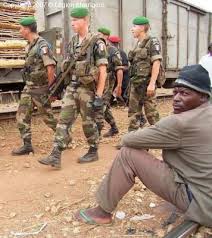Ivory Coast has officially joined the ranks of African nations cutting ties with their former colonial rulers, as it announces the expulsion of French troops from its soil. This historic decision was revealed by President Alassane Ouattara in his year-end address to the nation, marking a pivotal moment in the country’s pursuit of military autonomy and sovereignty.
Starting January 2025, French forces, which have been stationed in Ivory Coast since the country gained independence in 1960, will begin their withdrawal. The Port Bouet military base, which has long served as the hub for French operations in the country, will be transferred to Ivorian control. President Ouattara emphasized that this move was a strategic step in the modernization and self-reliance of the Ivorian military. “We have decided on the concerted and organized withdrawal of French forces,” Ouattara declared, signaling a shift away from foreign military presence towards strengthening Ivory Coast’s defense capabilities.
This decision follows a larger trend across West Africa, where growing anti-colonial sentiments and dissatisfaction with foreign military involvement have led to the expulsion of French troops from several nations. Just last year, Mali, Burkina Faso, and Niger saw the exit of French forces after a series of military coups. In November, Chad also ended its defense cooperation agreement with France, and Senegal, another former French colony, announced that all French military bases will be shut down by 2025.
Critics of France’s military presence in Africa have long argued that its forces serve more to perpetuate neo-colonial relationships rather than genuinely addressing the security concerns of African countries. “The presence of foreign troops has not led to long-term stability or effective solutions to the region’s security challenges,” said political analyst Kofi Afiado. “African nations are increasingly looking for alternatives, including expanding their relationships with other global powers like Russia.”
Russia, which has gained influence in parts of Africa, weighed in on Ivory Coast’s decision, with the Russian Foreign Ministry describing the withdrawal as a sign that French forces were “no longer needed” in the country. “This move aligns with the growing sentiment across Francophone countries in West Africa, whose populations are becoming more critical of the large-scale presence of foreign troops,” the Ministry stated.
France has faced increasing resistance to its military presence in Africa, particularly after the 2012 French-led intervention in Mali aimed at curbing Islamist militancy. While the French government maintains that its forces play a crucial role in counterterrorism efforts and regional stability, the growing wave of anti-French sentiment suggests otherwise. Several West African leaders, including those in Ivory Coast, are now emphasizing the importance of building independent and modernized military forces that are better suited to address local security concerns.
President Ouattara’s announcement comes on the heels of escalating calls for the reformation of military partnerships across the continent. Leaders in countries like Burkina Faso and Mali have actively pursued new alliances, particularly with Russia, as they push for a shift away from traditional Western military influences. This trend has sparked intense debate about the future of African security and the role of former colonial powers.
Ivory Coast’s decision is also viewed as a response to changing geopolitical dynamics. France’s evolving strategy in Africa, which seeks to scale down permanent troop deployments in favor of more targeted operations, reflects the growing unpopularity of long-term military interventions. The French government is also grappling with how to adapt to a rapidly shifting political landscape in West Africa. While Paris plans to maintain a smaller military presence in Djibouti and Gabon, Ivory Coast’s withdrawal signals a broader rejection of France’s traditional military footprint in the region.
Ivory Coast’s move is significant not only for its own national interests but also as part of a broader shift in African military autonomy. The Ivorian government’s focus on modernizing its armed forces will require significant investments in training, technology, and equipment. While the withdrawal of French forces marks a new chapter, it also highlights the pressing need for Ivory Coast to bolster its defense capabilities and build stronger regional partnerships to tackle emerging threats, particularly in the Sahel region, which remains unstable due to militant activities.
In his speech, President Ouattara also addressed the challenges facing Ivory Coast’s military modernization, calling for a concerted effort to develop a self-reliant defense strategy. “This is a moment for us to focus on strengthening our own capabilities,” he said, stressing the importance of enhancing cooperation with regional security forces and exploring new international partnerships.
The decision to expel French troops from Ivory Coast has been met with mixed reactions. While many view it as a necessary step towards reclaiming full sovereignty, others worry about the potential vacuum left by the departing foreign forces. The African Union (AU) and regional bodies like the Economic Community of West African States (ECOWAS) will play crucial roles in ensuring that the void left by French troops is filled with effective regional security cooperation.
Ivory Coast’s expulsion of French forces is part of a broader movement across the African continent, where former colonial powers are being asked to reassess their roles in the region. As African countries continue to reassess their security needs and partnerships, the power dynamics in West Africa are shifting, with implications for both local governance and global geopolitics.

